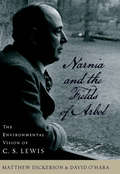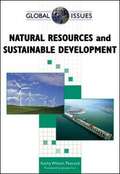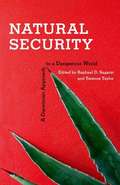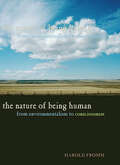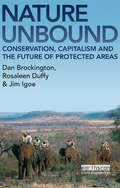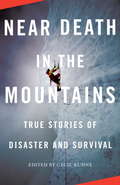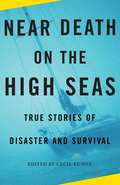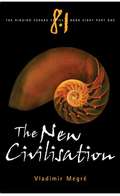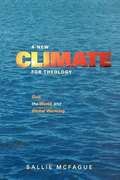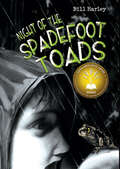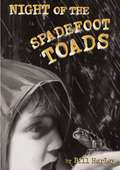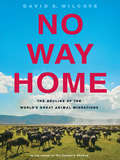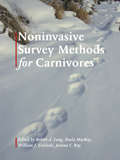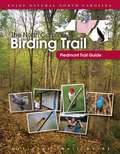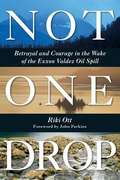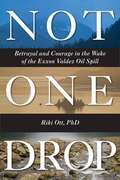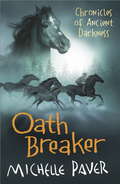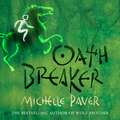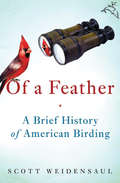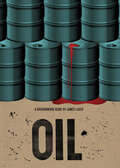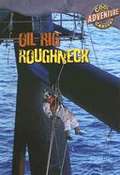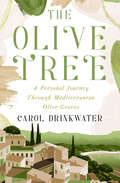- Table View
- List View
Narnia and the Fields of Arbol: The Environmental Vision of C.S. Lewis (Culture of the Land #Cull)
by Matthew Dickerson David O'HaraScholars have discussed the work of C. S. Lewis (1898--1963) for decades, but they have focused on Lewis's Christian and pagan allusions and have largely ignored his other important themes. Narnia and the Fields of Arbol: The Environmental Vision of C. S. Lewis is the first book dedicated to Lewis's vision of our relationship to nature and the environment. Matthew T. Dickerson and David O'Hara examine The Chronicles of Narnia and the Ransom books, as well as The Great Divorce, The Abolition of Man, and Lewis's essays and personal correspondence, connecting his writing with that of authors more traditionally associated with environmentalism, such as Wendell Berry, Aldo Leopold, and Gary Snyder. Narnia and the Fields of Arbol offers a fresh way for readers across disciplines to understand the work of this literary legend.
Natural Resources and Sustainable Development
by Kathy Wilson PeacockJeremy Carl (Program on Energy and Sustainable Development, Stanford U.) introduces this volume by noting that whether development is viewed as more or less sustainable depends on how "sustainable development" is defined. Peacock (a generalist writer/ editor) presents a balanced introduction to this pivotal contemporary environmental, political, and social concept. Starting with factors contributing to the devastation of New Orleans by Hurricane Katrina, she examines issues of urbanization, over- consumption, and overpopulation from US and global perspectives. Written specifically with high school students in mind, the volume includes source documents, an annotated bibliography, chronology from prehistory to the near future, and a glossary. Annotation ©2008 Book News, Inc., Portland, OR (booknews.com)
Natural Security: A Darwinian Approach to a Dangerous World
by Raphael D. Sagarin Terence TaylorThe post 9/11 world has so far failed to exploit the insights of the greatest experiment in security of all time--the millions of successful defensive and offensive security strategies that abound in nature. Arms races among invertebrates, intelligence gathering by the immune system, alarm calls by marmots are but a few of nature's security strategies that have been tested and modified over billions of years. This provocative book applies lessons from nature to our own toughest security problems-from global terrorism to the rise of infectious disease to natural disasters. Written by a truly multi-disciplinary group including paleobiologists, anthropologists, psychologists, ecologists, and national security experts, it considers how models and ideas from evolutionary biology can improve national security strategies ranging from risk assessment, security analysis, and public policy to long-term strategic goals. Written with the aim of breaking down barriers between disparate disciplines in order to create more responsive and effective strategies,Natural Security provides a new lens through which to explore the ancient and ever present problem of how to maintain security in an unpredictable, complex, and dangerous world.
The Nature of Being Human: From Environmentalism to Consciousness
by Harold FrommAlthough the physical relationship between the natural world and individuals is quantifiable, the psychosocial effect of the former on the latter is often less tangible. What, for instance, is the connection between the environment in which we live and our creativity? How is our consciousness bounded and delimited by our materiality? And from whence does our idea of self and our belief in free will derive and when do our surroundings challenge these basic assumptions? Ecocritic Harold Fromm's challenging exploration of these and related questions twines his own physical experiences and observations with insights gathered from both the humanities and the sciences. Writing broadly and personally, Fromm explores our views of nature and how we write about it. He ties together ecology, evolutionary psychology, and consciousness studies to show that our perceived separation from our surroundings is an illusory construct. He argues for a naturalistic vision of creativity, free will, and the literary arts unimpeded by common academic and professional restraints. At each point of this intellectual journey, Fromm is honest, engaging, and unsparing.Philosophical, critical, often personal, Fromm's sweeping, interdisciplinary, and sometimes combative essays will change the way you think about your place in the environment.
The Nature of Being Human: From Environmentalism to Consciousness
by Harold FrommEssays exploring humanity’s connection with the environment.Although the physical relationship between the natural world and individuals is quantifiable, the psychosocial effect of the former on the latter is often less tangible. What, for instance, is the connection between the environment in which we live and our creativity? How is our consciousness bounded and delimited by our materiality? And from whence does our idea of self and our belief in free will derive and when do our surroundings challenge these basic assumptions?Eco-critic Harold Fromm’s challenging exploration of these and related questions twines his own physical experiences and observations with insights gathered from both the humanities and the sciences. Writing broadly and personally, Fromm explores our views of nature and how we write about it. He ties together ecology, evolutionary psychology, and consciousness studies to show that our perceived separation from our surroundings is an illusory construct. He argues for a naturalistic vision of creativity, free will, and the literary arts unimpeded by common academic and professional restraints. At each point of this intellectual journey, Fromm is honest, engaging, and unsparing.Philosophical, critical, often personal, Fromm’s sweeping, interdisciplinary, and sometimes combative essays will change the way you think about your place in the environment.“How rare it is that a work of philosophical inquiry is written with the passion of a cri de coeur, but Harold Fromm’s brilliantly conceived The Nature of Being Human resonates with such uncanny depths. Here is an utterly engrossing first-person account of a harrowing pilgrimage into the 21st century and its disturbing revelations about humankind’s truest nature, in contrast to the comforting solicitudes of a “humanist” past. If the role of the philosopher is to force us to think, Harold Fromm is a born philosopher.” —Joyce Carol Oates“Fromm, an erudite, prolific author of numerous works ranging from ecocritical commentary to self-reflective discourses, presents a compilation of essays that illuminate his views regarding why most Americans seem oblivious to the destruction of their environment.” —Choice“Fromm’s journey from victim, to campaigner, to pioneer of eco-criticism (that is, the study of literature from an ecological viewpoint) is documented here, alongside challenging analyses of man’s place in nature, free will, our relationship with technology and more. Scholarly but engaging, Fromm is an environmentalist, but also a realist.” —Organic Gardener
Nature Unbound: "Conservation, Capitalism and the Future of Protected Areas"
by Rosaleen Duffy Dan Brockington Jim IgoeThis groundbreaking volume is the first comprehensive, critical examination of the rise of protected areas and their current social and economic position in our world. It examines the social impacts of protected areas, the conflicts that surround them, the alternatives to them and the conceptual categories they impose. The book explores key debates on devolution, participation and democracy; the role and uniqueness of indigenous peoples and other local communities; institutions and resource management; hegemony, myth and symbolic power in conservation success stories; tourism, poverty and conservation; and the transformation of social and material relations which community conservation entails. For conservation practitioners and protected area professionals not accustomed to criticisms of their work, or students new to this complex field, the book will provide an understanding of the history and current state of affairs in the rise of protected areas. It introduces the concepts, theories and writers on which critiques of conservation have been built, and provides the means by which practitioners can understand problems with which they are wrestling. For advanced researchers the book will present a critique of the current debates on protected areas and provide a host of jumping off points for an array of research avenues
Near Death in the Mountains: True Stories of Disaster and Survival
by Cecil Kuhne"He wrapped the rope around his body, got ready to rappel and leaned back. Standing about five feet from him, I heard a sharp scraping, Suddenly Ed was flying. I could see him fall, wordless, fifty feet free, then strike the steep ice below...he was sliding and bouncing down. He passed out of sight, but I heard his body bouncing. There wasn't a chance of his stopping for 4,000 feet."--From David Robert's The Mountain of My FearIn these thrillingly true tales of narrow brushes with death, Cecil Kuhne has amassed a wide range of stories that show the awesome power of the mountains. Spanning five continents, from the frosty tip of Mount McKinley in the dead of the winter, to the unexplored vastness of the Himalayas and beyond, this is a pulse-pounding collection of disaster and survival at the top of the world. Also featuring:* Joe Simpson's Touching the Void--An inspiring story of a climber who topples into a icy crevasse and, though crippled, starving and frostbitten, still manages to crawl to rescue. * Jon Krakauer's Eiger Dreams--Reaching the limits of his own climbing skills, the author makes a crucial decision whether to brave the treacherous higher altitudes or return to base.* Nando Parrado's Miracle in the Andes--The stunning first-person account of a Peruvian rugby team's airplane crash in the Chilean Andes and their harrowing journey down the mountain for help.From the Trade Paperback edition.
Near Death on the High Seas: True Stories of Disaster and Survival (Vintage Departures)
by Cecil Kuhne"The wind was blowing at hurricane strength-sixty-five knots and over-and increasing in the gusts to eighty knots. His boat was surfing on waves as high as a sixty-foot, six-storey building... Each wave that struck choked and froze him, the icy water working its way down inside his survival suit." --from Close to the Wind by Pete Goss. In Near Death on the High Seas, Cecil Kuhne collects some of the most terrifying and astounding experiences of sailors confronting the awesome, raw power of the sea. These tales--filled with everyday heroes and survivors--comprise a riveting and often breathtaking collection of extraordinary stories that show the terrible ferocity of the untamable ocean. Also featuring: Thor Heyerdahl's Kon-Tiki- the historic and celebrated journey of the Kon-Tiki as it journeys across the Pacific. Steve Callahan's Adrift- a solo sailor loses his boat in the Atlantic must survive in a five-foot life raft for 76 days, fighting off sharks with a makeshift spear. Francis Chischester's 'Gipsy Moth' Circles The World-the stirring story of a one man's solo sail around the globe at age 65. John Rousmaniere's Fastnet, Force 10--in one of the worst sailing tragedies in history, a massive rescue operation takes place amidst sixty-knot winds and forty-foot breaker waves.
The New Civilisation (The Ringing Cedars Series #8, Part #1)
by Vladimir Megré John Woodsworth Leonid Sharashkin"The New Civilisation" is Book 8 Part 1 of The Ringing Cedars Book Series. This series of nine books tells the story of a remarkable woman named Anastasia, discovered in 1995 by a Siberian trader, Vladimir Megré, while he was plying the waters of the remote Ob River. Anastasia was born in the forest in 1969 to parents who died tragically when she was just a baby. Living for the most part without warm clothes, food cultivation or man-made shelter, she has survived on fruit, nuts, berries and mushrooms, brought to her by "wild" animals with which she lives in peaceful harmony. Megré initially spent three days with Anastasia, during which time she displayed such astounding knowledge, power and wisdom that he abandoned his business and, at her request, began writing this series. She told him she would encode the books with an energy that would cause them to sell in the millions. Despite his lack of writing experience, this is exactly what happened. It is Anastasia's ability to strike a chord in the heart of the reader that makes these books so very unusual. The purity and power of her words is provoking an outpouring of joy and hope in people from all walks of life.
A New Climate For Theology: God, The World, And Global Warming
by Sallie McFagueClimate change promises monumental changes to human and other planetary life in the next generations. Yet government, business, and individuals have been largely in denial of the possibility that global warming may put our species on the road to extinction. Further, says Sallie McFague, we have failed to see the real root of our behavioral troubles in an economic model that actually reflects distorted religious views of the person. At its heart, she maintains, global warming occurs because we lack an appropriate understanding of ourselves as inextricably bound to the planet and its systems. A New Climate for Theology not only traces the distorted notion of unlimited desire that fuels our market system; it also paints an alternative idea of what being human means and what a just and sustainable economy might mean. Convincing, specific, and wise, McFague argues for an alternative economic order and for our relational identity as part of an unfolding universe that expresses divine love and human freedom. It is a view that can inspire real change, an altered lifestyle, and a form of Christian discipleship and desire appropriate to who we really are. Table of Contents Preface Part One: The Science and its Significance for Theology Chapter 1: Climate Change: The Evidence and Consequences Chapter 2: Global Warming: A Theological Problem Part Two: Exploring God and the World within Climate Change Chapter 3: Who Are We? Ecological Anthropology Chapter 4: Who Is God? Creation and Providence Chapter 5: How Shall We Live? Christianity and Planetary Economics Part Three: Serving God and City Living within Climate Change Chapter 6: Why We Worship: Praise and Compassion as Intimations of Transcendence Chapter 7: Where We Live: Urban Ecotheology Part Four: Despair and Hope within Climate Change Chapter 8: Is a Different World Possible? Human Dignity and the Integrity of Creation in a Time of Global Warming Chapter 9: ?The Dearest Freshness Deep Down Things: The Holy Spirit and Climate Change Notes
Night of the Spadefoot Toads
by Bill HarleyAn inspiring story of intergenerational friendship, activism, and how our actions can drastically impact our environment.When his father takes a new job in Massachusetts, Ben Moroney must leave behind his best friend Tony, a western banded gecko named Lenny, and worst of all, the Arizona desert home he has loved and explored. Ben's adjustment to his new environment is not going well until he unexpectedly finds a kindred spirit in his eccentric fifth-grade science teacher, Mrs. Tibbets. She introduces him to the rare and elusive Eastern spadefoot toads that make their home on her rural property. When Ben discovers that Mrs. Tibbets's land may be sold to developers, he knows he has to do something. As Ben's obsession with saving the spadefoot toads' habitat grows, his schoolwork and his relationships with his family and new friends suffer. But just when it seems things can't get any worse, Ben finds a way to meet his responsibilities to the people around him and demonstrates the importance of even the smallest efforts to save the earth's rapidly disappearing habitats.
Night of the Spadefoot Toads
by Bill HarleyWhen his family moves from Tucson, Arizona to Massachusetts, fifth-grader Ben has a hard time leaving the desert he loves, but when he finds a kindred spirit in his science teacher and ends up trying to help her with some of her problems, he finally begins to feel at home.
No Way Home: The Decline of the World's Great Animal Migrations
by David S. WilcoveAnimal migration is a magnificent sight: a mile-long blanket of cranes rising from a Nebraska river and filling the sky; hundreds of thousands of wildebeests marching across the Serengeti; a blaze of orange as millions of monarch butterflies spread their wings to take flight. Nature's great migrations have captivated countless spectators, none more so than premier ecologist David S. Wilcove. In No Way Home, his awe is palpable--as are the growing threats to migratory animals. We may be witnessing a dying phenomenon among many species. Migration has always been arduous, but today's travelers face unprecedented dangers. Skyscrapers and cell towers lure birds and bats to untimely deaths, fences and farms block herds of antelope, salmon are caught en route between ocean and river, breeding and wintering grounds are paved over or plowed, and global warming disrupts the synchronized schedules of predators and prey. The result is a dramatic decline in the number of migrants. Wilcove guides us on their treacherous journeys, describing the barriers to migration and exploring what compels animals to keep on trekking. He also brings to life the adventures of scientists who study migrants. Often as bold as their subjects, researchers speed wildly along deserted roads to track birds soaring overhead, explore glaciers in search of frozen locusts, and outfit dragonflies with transmitters weighing less than one one-hundredth of an ounce. Scientific discoveries and advanced technologies are helping us to understand migrations better, but alone, they won't stop sea turtles and songbirds from going the way of the bison or passenger pigeon. What's required is the commitment and cooperation of the far-flung countries migrants cross--long before extinction is a threat. As Wilcove writes, "protecting the abundance of migration is key to protecting the glory of migration." No Way Home offers powerful inspiration to preserve those glorious journeys.
Noninvasive Survey Methods for Carnivores
by Justina Ray Paula Mackay William Zielinski Robert A. LongThe status of many carnivore populations is of growing concern to scientists and conservationists, making the need for data pertaining to carnivore distribution, abundance, and habitat use ever more pressing. Recent developments in "noninvasive" research techniques--those that minimize disturbance to the animal being studied--have resulted in a greatly expanded toolbox for the wildlife practitioner. Presented in a straightforward and readable style, Noninvasive Survey Methods for Carnivores is a comprehensive guide for wildlife researchers who seek to conduct carnivore surveys using the most up-to-date scientific approaches. Twenty-five experts from throughout North America discuss strategies for implementing surveys across a broad range of habitats, providing input on survey design, sample collection, DNA and endocrine analyses, and data analysis. Photographs from the field, line drawings, and detailed case studies further illustrate on-the-ground application of the survey methods discussed. Coupled with cutting-edge laboratory and statistical techniques, which are also described in the book, noninvasive survey methods are effi cient and effective tools for sampling carnivore populations. Noninvasive Survey Methods for Carnivores allows practitioners to carefully evaluate a diversity of detection methods and to develop protocols specific to their survey objectives, study area, and species of interest. It is an essential resource for anyone interested in the study of carnivores, from scientists engaged in primary research to agencies or organizations requiring carnivore detection data to develop management or conservation plans.
The North Carolina Birding Trail
by North Carolina Birding TrailNorth Carolina harbors an incredible diversity of habitats that provide food and shelter for more than 440 bird species throughout the year, making the state a destination for birders and nature lovers. The North Carolina Birding Trail is a driving trail linking birders and tourists with great birding sites across the state and the local communities in which they are found.The second of three regional guides, the Piedmont Trail Guide presents 103 premier birding destinations in the North Carolina piedmont, most within an easy drive of the state's urban centers, between Charlotte on the west and Interstate 95 on the east. The spiral-bound volume features maps, detailed site descriptions, and color photographs throughout. Each site description includes directions as well as information on access, focal species and habitats, and on-site visitor amenities. Special "while you're in the area" listings accompany each of fourteen site groupings, so visitors can travel to a cluster of birding destinations and enjoy other local highlights and attractions along the way.
Not One Drop
by Riki OttThis DVD/book package should be read and viewed by everyone concerned with crimes against man and nature; about corporate lies and the value of community. Betrayed by oilmen's promises in the 1970s, the people of Prince William Sound, Alaska, awaken on March 14, 1989, to the nation's largest oil spill. Not One Dropis an extraordinary tale of ordinary lives ripped apart by disaster and of community healing through building relationships of trust. This story offers critical lessons for a society traumatized by political divides and facing the looming catastrophe of global climate change. Author Riki Ott, a rare combination of commercial salmon "fisherm'am" and PhD marine biologist, describes firsthand the impacts of oil companies' broken promises when the Exxon Valdez spills most of its cargo and despoils thousands of miles of shore. Ott illustrates in stirring fashion the oil industry's 20-year trail of pollution and deception that predated the tragic 1989 spill and delves deep into the disruption to the fishing community of Cordova over the following 19 years. In vivid detail, she describes the human trauma coupled inextricably with that of the sound's wildlife and its long road to recovery. Black Wave (DVD) -directed by Robert Cornellier, tells the story of the biggest environmental catastrophe in North American history. In a flash, dramatic images shoot across the planet. They show thousands of carcasses of seabirds and sea otters covered in oil. A thick black tide rises and covers the beaches of once-pristine Prince William Sound. For twenty years Riki Ott and the fishermen of the little town of Cordova, Alaska have waged the longest legal battle in U. S. history against the world's most powerful oil company - ExxonMobil. They tell us all about the environmental, social and economic consequences of the black wave that changed their lives forever. Not One DropandBlack Waveshow us how too many corporate owners and political leaders betray everyday citizens and how a community forges a new path from despair to hope.
Not One Drop: Betrayal and Courage in the Wake of the Exxon Valdez Oil Spill
by Riki OttShocking, factual, and inspiring, Not One Drop traces the twenty-year trail of Cordova, Alaska, residents as they cope with the largest oil spill and one of the longest-running court cases in U.S. history--and, ultimately, the failure of Exxon to come through on its promise to compensate them adequately for their losses and clean up their environment after the Exxon Valdez oil spill.
Oath Breaker: Book 5 from the bestselling author of Wolf Brother (Chronicles of Ancient Darkness #5)
by Michelle PaverA boy. A wolf. A legend for all time. The fifth book in the internationally bestselling WOLF BROTHER (Chronicles of Ancient Darkness) series by the renowned author Michelle Paver.When he was outcast, Torak was the hunted one. The following spring, he becomes the hunter when he swears to avenge the killing of one of his closest friends. To fulfil his oath he must brave the hidden valleys of the Deep Forest, where the clans have reverted to the savagery of an earlier time. Here, Torak finally learns why he is the Sprit Walker and discovers the true cost of revenge. Audio edition also available, read by Sir Ian McKellen.
Oath Breaker: Book 5 from the bestselling author of Wolf Brother (Chronicles of Ancient Darkness #5)
by Michelle PaverA boy. A wolf. A legend for all time. The fifth book in the internationally bestselling WOLF BROTHER (Chronicles of Ancient Darkness) series by the renowned author Michelle Paver. Audio edition read by Sir Ian McKellen.When he was outcast, Torak was the hunted one. The following spring, he becomes the hunter when he swears to avenge the killing of one of his closest friends.To fulfil his oath he must brave the hidden valleys of the Deep Forest, where the clans have reverted to the savagery of an earlier time. Here, Torak finally learns why he is the Sprit Walker and discovers the true cost of revenge.
Oath Breaker: Book 5 from the bestselling author of Wolf Brother (Chronicles of Ancient Darkness #5)
by Michelle PaverA boy. A wolf. A legend for all time. The fifth book in the internationally bestselling WOLF BROTHER (Chronicles of Ancient Darkness) series by the renowned author Michelle Paver.When he was outcast, Torak was the hunted one. The following spring, he becomes the hunter when he swears to avenge the killing of one of his closest friends. To fulfil his oath he must brave the hidden valleys of the Deep Forest, where the clans have reverted to the savagery of an earlier time. Here, Torak finally learns why he is the Sprit Walker and discovers the true cost of revenge. Audio edition also available, read by Sir Ian McKellen.
Of a Feather: A Brief History of American Birding
by Scott WeidensaulBeyond Audubon: A quirky, &“lively and illuminating&” account of bird-watching&’s history, including &“rivalries, controversies, [and] bad behavior&” (The Washington Post Book World). From the moment Europeans arrived in North America, they were awestruck by a continent awash with birds—great flocks of wild pigeons, prairies teeming with grouse, woodlands alive with brilliantly colored songbirds. Of a Feather traces the colorful origins of American birding: the frontier ornithologists who collected eggs between border skirmishes; the society matrons who organized the first effective conservation movement; and the luminaries with checkered pasts, such as Alexander Wilson (a convicted blackmailer) and the endlessly self-mythologizing John James Audubon. Naturalist Scott Weidensaul also recounts the explosive growth of modern birding that began when an awkward schoolteacher named Roger Tory Peterson published A Field Guide to the Birds in 1934. Today, birding counts iPod-wearing teens and obsessive &“listers&” among its tens of millions of participants, making what was once an eccentric hobby into something so completely mainstream it&’s now (almost) cool. This compulsively readable popular history will surely find a roost on every birder&’s shelf. &“Weidensaul is a charming guide. . . . You don&’t have to be a birder to enjoy this look at one of today&’s fastest-growing (and increasingly competitive) hobbies.&” —The Arizona Republic
Oil: A Groundwork Guide (Groundwork Guides)
by James LaxerThis book explores today’s global dependency on oil and reveals the sobering realities of the relationship between oil, politics and money. An excellent introduction for young adults.Oil, our main source of energy, underlies the world's economy. In the twentieth century its availability and relatively low price allowed for the industrial growth and development of the world's leading economies. The new rapidly developing giants, India and China, want access to the same possibilities. But today we know that cheap, easily accessible oil supplies are dwindling, and we are beginning to recognize the true cost to the world's environment of our profligate use of this form of energy.As Oil shows, a substantial portion of the world's remaining supply lies in countries whose interests are not identical with those of the major industrial powers."[The Groundwork Guides] are excellent books, mandatory for school libraries and the increasing body of young people prepared to take ownership of the situations and problems previous generations have left them." -- Globe and Mail
Oil Rig Roughneck (Cool Adventure Careers)
by Geoffrey M. HornThe first group of titles in an ongoing series introduces students to six amazing adventure careers. Geared for reluctant readers in upper elementary school and above, each high-interest title combines easy-to-follow text with engaging on-the-job photos to spark students' interest in reading and career exploration. Each book is filled with descriptive information about the career, along with the skills and requirements needed to pursue a job in the profiled field.
Old Dogs
by Michael S. Williamson Gene WeingartenAnyone who has ever loved an old dog will love Old Dogs. In this collection of profiles and photographs, Weingarten and Williamson document the unique appeal of man's best friend in his or her last, and best, years. This book is a tribute to every dog who has made it to that time of life when the hearing and eyesight begin to go, when the step becomes uncertain, but when other, richer traits ripen and coalesce. It is when a dog attains a special sort of dignity and a charm all his own. If you've known a favorite old dog, you'll find him or her on these pages. Your dog might go by a different name and have a different shape, but you'll recognize him or her by the look in an eye or the contours of a life story. There is the dog who thinks he is a house cat; the herder, the fetcher, the punk and the peacock, the escape artist, the demolition artist, the patrician, the lovable lout, the amiable dope, the laughable clown, the schemer, the singer, the daredevil, the diplomat, the politician, the gourmand, and the thief. Plus, as a special bonus, you will find the first Latvian elkhounds ever photographed. Old Dogs is a glorious gift book and a fitting tribute to that one dog you can't ever forget.
The Olive Tree: A Personal Journey Through Mediterranean Olive Groves (The Olive Farm Series)
by Carol DrinkwaterAn olive farmer journeys through Spain, Italy, and North Africa to find the future of agriculture in an age of chemicals and climate challenges. Carol Drinkwater&’s beloved olive farm in the South of France was suffering badly from destructive pests and premature ripening. In a hunt for answers, she decided to set out on her own for a fact-finding tour of Spain, Italy, Morocco, and Algeria. In The Olive Tree, Carol recounts not only the agricultural education she gained during her travels, but the dangers she faced as terrorist bombs rocked one of her destinations and a group of beekeepers helped shepherd her through dangerous territory. Through it all, she confronts issues faced by farmers and non-farmers alike in today&’s world, from climate change to diminishing water reserves to the excessive use of chemicals. Ultimately, she will return to her land in Provence with a new appreciation for the urgency of these problems—and with an ingenious vision for the future shared with her by a brilliant group of olive growers . . .Praise for the Olive Farm series &“Vibrant, intoxicating and heartwarming.&” —Sunday Express &“Spellbinding . . . a must for anyone who dreams of moving to a kinder climate and starting a new life.&” —Choice
